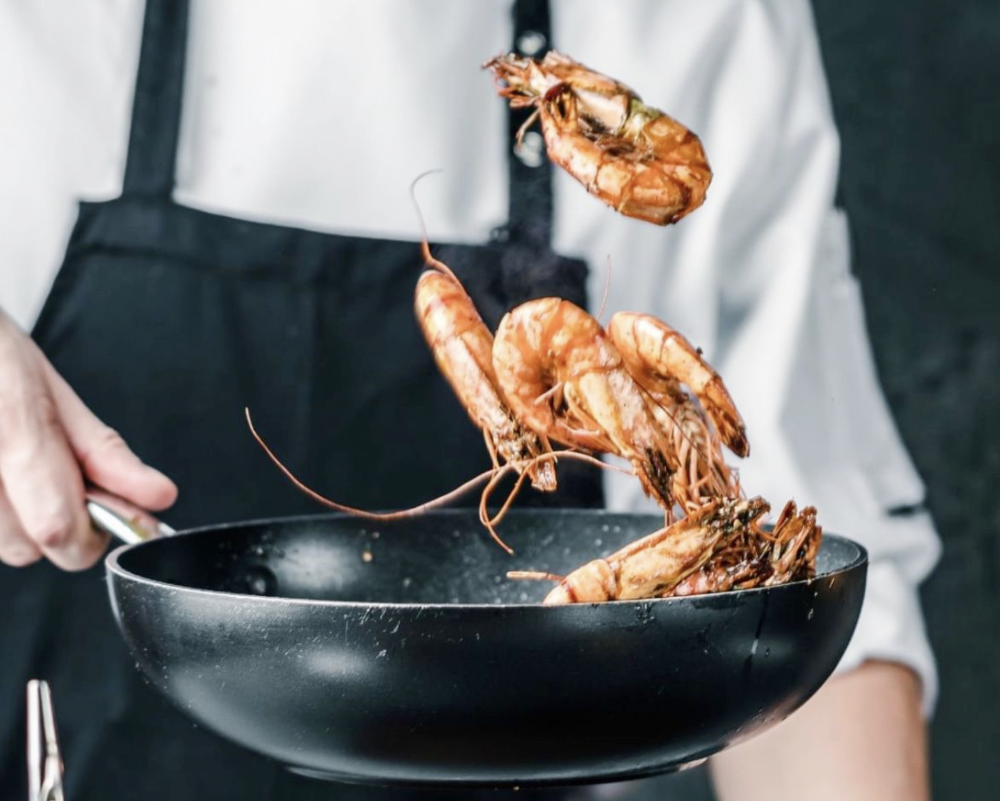JEDDAH: Frugal Saudi hotels and restaurants have been cooking up ways to cut down on Ramadan food waste and overindulgence.
The Kingdom’s hospitality sector annually caters for extravagant iftar and sahoor buffets during the holy month of fasting.
But this year many high-end businesses have stepped up their game in adopting strategies to limit the amount of food thrown away.

Live cooking stations at the Jeddah Hilton buffet is a helpful strategy to avoid cooking more than required and control the wastage of food. (Instagram/jeddahilton)
The Jeddah Hilton, and Waldorf Astoria Jeddah — Qasr Al Sharq, have launched awareness campaigns around local sourcing and food waste.
Assistant food and beverage manager at the Jeddah Hilton, Nouf Al-Dhahri, told Arab News: “We implemented a system to accurately measure wastage daily and help control it. The digital initiative will play a crucial role in collecting food-waste data and use it to inform our local procurement requirements.
“We are also making food at live buffet stations to avoid cooking in advance. This not only helps to control wastage but enhances the guest experience with chef interactions.”
We implemented a system to accurately measure wastage daily and help control it. The digital initiative will play a crucial role in collecting food-waste data and use it to inform our local procurement requirements.
Nouf Al-Dhahri, Assistant food and beverage manager, Jeddah Hilton
Ramadan diners at the Jeddah Hilton are being offered Italian, Indian, Saudi, Levant, and Middle Eastern cuisines made to order at live cooking stations, along with drinks and a variety of fresh Saudi desserts produced by local chefs.

Swissotel living Jeddah collaborates with local charities to donate leftover food from the buffet to underprivileged communities. (Instagram/swissotellivingjeddah)
And vegetable peelings from the hotel are turned into a dried powder for use on farms.
Meanwhile, guests at the Swissotel Living Jeddah are being urged to help minimize food waste by restricting portion sizes to what they can eat.
Hotel general manager, Jaouad Sbihi, said: “Our key strategy is to collaborate with local food charities to donate leftover food to those in need and we are aiming to collaborate with a reputable food charity organization to pack and distribute the remaining food from the buffet to underprivileged communities.”

Guests at buffets can contribute to combating food wastage by restricting portion sizes to what they can eat. (Instagram/RosewoodJeddah)
The hotel has also implemented a cook-to-order system to allow guests to order sahoor meals in smaller portions, while its iftar buffet layout and menu planning has been optimized to minimize food wastage.
Additionally, the hotel has introduced a monitoring system to help identify sources of waste and develop measures to reduce them. Its culinary team has prepared an Oriental spread combining traditional Arabian choices with modern twists using locally sourced, high-quality ingredients.
Mazen Allam, managing director at the luxury Rosewood Jeddah hotel, said: “We aim to move away from the big platter and chafing dish presentation toward individual portioning to control over production.
“Also, we have live cooking stations for our guests to order fresh and ensure food products are repeated in different cooking and preparation styles throughout the offered rotational menu cycles.”
The Rosewood also operates strict portioning controls with a smart menu plan and next year plans to initiate a composting facility and scheme to donate food to local charities.
Hotels have also been training kitchen managers and staff on how to avoid overproduction of food and overordering of raw materials.
Juan Uribe, general manager at The Venue Jeddah Corniche, said: “We have planned to prepare food fresh as per consumption, with more if required. Our iftar and sahoor menus have a distinctive uniqueness offering guests a freshly made and mood-based menu selection.”
Mohammed Saleh, a Yemen restaurant manager, adopted a similar strategy of preparing food in limited quantities and creating a meal plan, and distributing leftover food to charity organizations.
The Movenpick Hotel Tahlia Jeddah was last year among the top-10 most popular venues for iftar.
For Ramadan this year, its director of food and beverage, Monther Abou Alssil, said: “We planned to have the most unique iftar experience in the Kingdom with chefs preparing lavish menus.
“To minimize the food wastage, we plan to use an organic waste disposal machine that turns food waste into productive soil.”






























